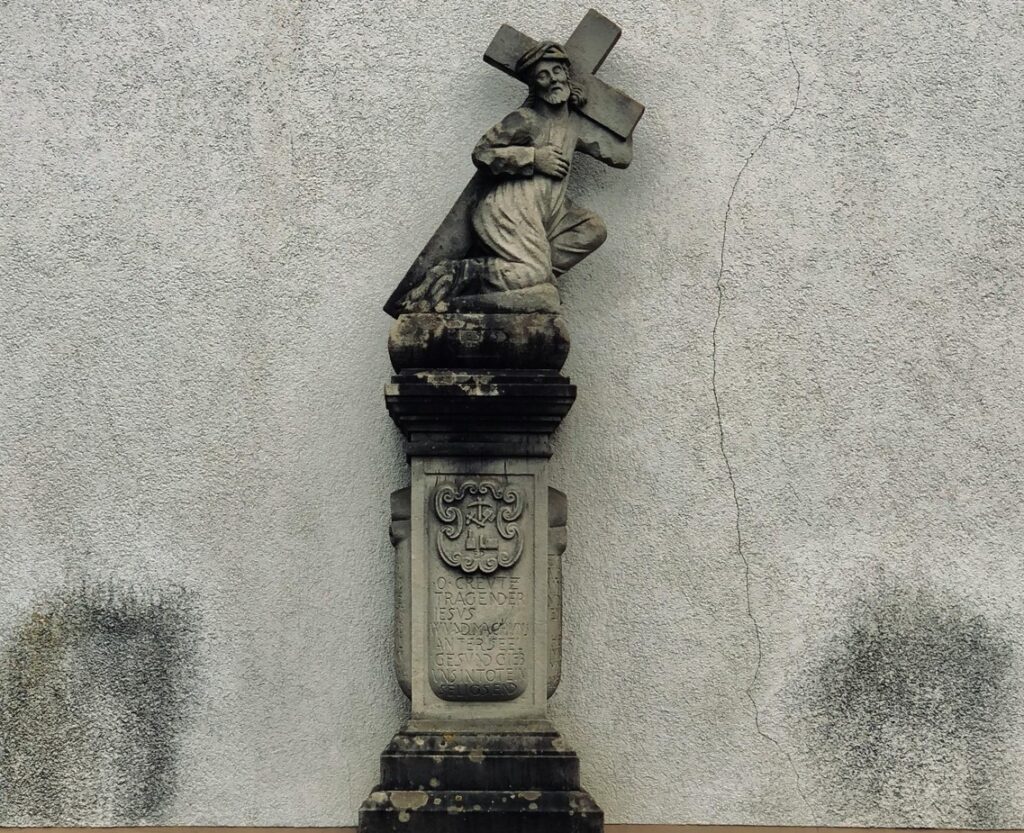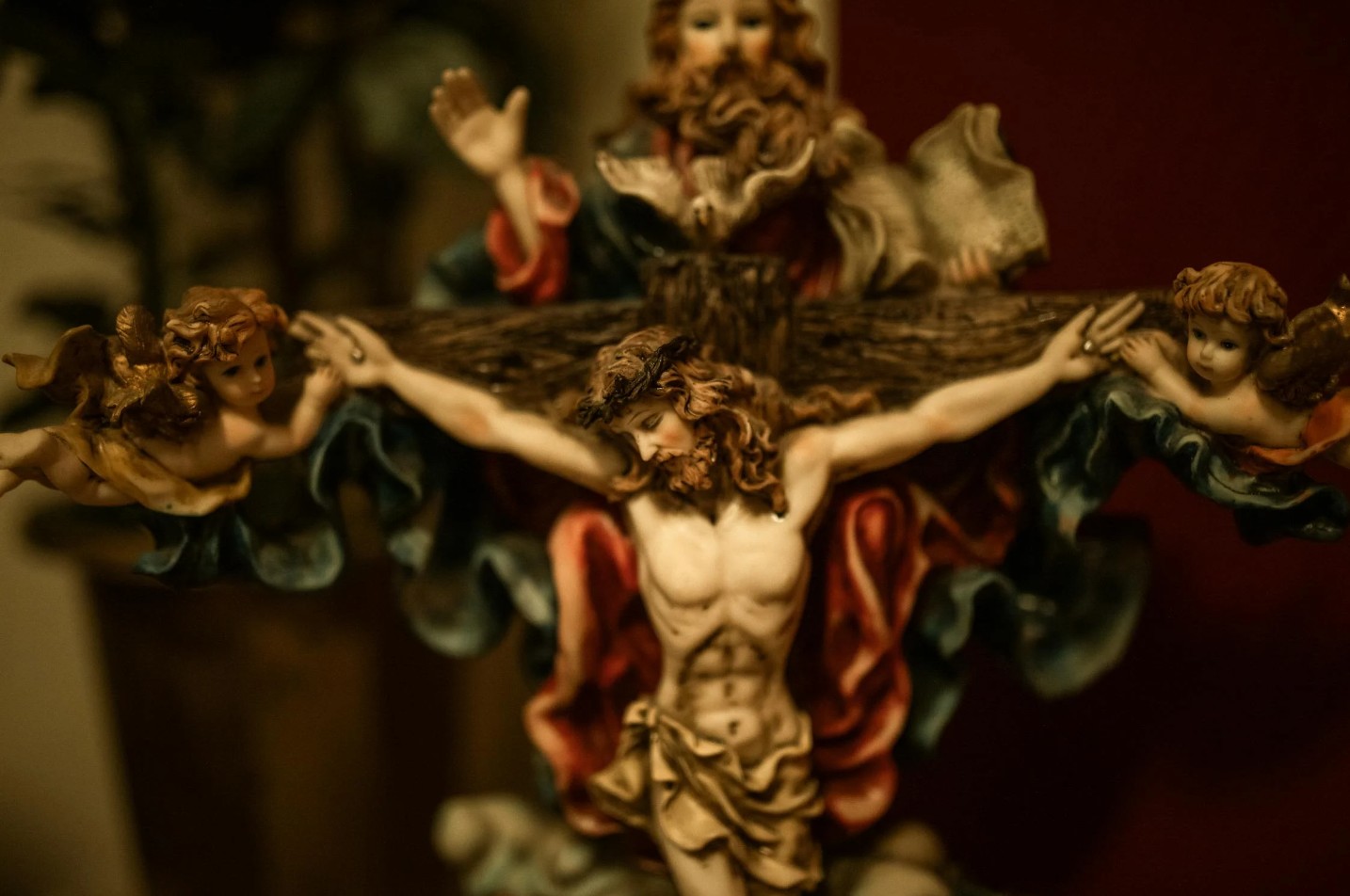Jesus tells people in Matthew 16:24: “If anyone wants to come after Me, he must deny himself, take up his cross, and follow Me.” When we look at the cross, it represents suffering. For our sake, Jesus was scourged and crucified, so that we may live. We should also follow in his footsteps, but perhaps, not in the literal sense of crucifixion. But by identifying our wounds, addressing them, and offering them up to God. When we do this, we imitate our Lord by carrying our crosses. Our suffering may take many shapes and forms. But one type of suffering that I’ve identified that is particularly burdensome, is parental wounds. Growing up, we often look at our parents as these sort of heroic figures. They seem to know everything. They’re bigger and stronger than us, and their ability to provide for our needs gives them a heroic glow that sometimes makes them come off as perfect.
Our innocence as children can veil the imperfections they may have, and maybe this is for the better. But as we grow we begin to realize how these imperfections can leave lasting wounds for us and our parents.

Speaking from personal experience
When I was seven, my parents ended their 10-year relationship. My memory is foggy from that age, but I remember that my dad wasn’t present at the end of my seventh birthday party. I’ve asked my mom about it recently and she says that he was there earlier in the day. But maybe it’s a repressed memory of mine because to this day I don’t remember him being there. What I do remember is the night of that birthday, my family gathered around me and my cake as they sang to me. I looked around at the faces of my family members smiling, but my dad wasn’t there. I blew out the candles and the rest of that night was a blur. I didn’t know it then, but that was the onset of one of my parental wounds.

I remember the following weekend my dad picked me up from my mom’s house. She hadn’t quite explained to me what had happened yet, so there was an awkward silence. When we got to my dad’s new residence, he explained to me that his relationship with my mom hadn’t worked out, and this would be his new home.
My seven-year-old self didn’t know how to think or react. I believe I was just in denial. I don’t even remember crying about it, but a new sense of emptiness did open up in my chest. And, the rest of my childhood was difficult from a familial, emotional, and developmental standpoint. I love both of my parent’s and don’t blame them for any mistakes they may have made when I was a child, especially now that I’m an adult, but that’s just how things turned out.
I would have preferred to grow up in a whole and stable home. A home where every Christmas I could see family members from both my mom’s and dad’s side interact together and share stories, laughter, and celebration. Sometimes, I wonder what my life would have been like if my dad had been present in my home during my struggles growing up or as a young man. But things in life don’t always go down perfectly. I could have grown up being resentful of my parents, and to be honest, sometimes there were moments of resentment. But it never completely consumed me. I was often sad about our situation, but I didn’t let it drive me to wrath.
Love Your Neighbor
God commands us to honor our mothers and our fathers. However, maybe this isn’t because they should be obeyed without questioning, but because only the love and respect that we give our parents can lead to healing and addressing the brokenness in our world. After all, societies are built off of the family unit. We emulate in the world what we do daily within our own homes.
You might even decide to look at your parents as your first “neighbors” to apply what Jesus considered the second of the two most important commandments.
Matthew 22:36-40 reads: “‘which commandment in the law is the greatest?” He said to him, “‘You shall love the Lord your God with all your heart, and with all your soul, and with all your mind.’ This is the greatest and first commandment. And a second is like it: ‘You shall love your neighbor as yourself.’ On these two commandments hang all the law and the prophets.”
You might be thinking, “This is great and all, but my parents are terrible” or “There is no remedy to our relationship.”
I understand having those sentiments, but our God can make all things new. And, I can only really offer my own insights to my relationship with my parents.
As I got closer to God when I was a teenager, I learned about his love and mercy. I learned that even if my earthly parents were imperfect, I had the Father in heaven who claims me as a son as mentioned in 2 Corinthians 6:18. And our heavenly father always has a a plan for us.
“For surely I know the plans I have for you, says the Lord, plans for your welfare and not for harm, to give you a future with hope” (Jeremiah 29:11).
God’s fatherhood is perfect. In every instance in the Bible, God is calling us into a deeper relationship with him. To non-Christians, stories in the Bible may seem violent, but God is constantly trying to call us away from our own fallen nature. By just reading the aforementioned passage, God never intends us to be harmed.
Having the knowledge that we have a Heavenly Father to who we are called to love, can provide some clarity as to how we should treat our earthly parents.
Biblical Wisdom

God, through his scriptures, often gives us guidance on how we should treat our parents. After all, the fifth commandment that God gave to Moses on Mount Sinai is: “to honor your mother and father.” We find more thorough instruction relating to the fifth commandment in other parts of the Bible. In the Old Testament, the Book of Sirach hints that one should have patience with their aging parents,
12 My child, help your father in his old age,
and do not grieve him as long as he lives;
13 even if his mind fails, be patient with him;
because you have all your faculties do not despise him.
14 For kindness to a father will not be forgotten,
and will be credited to you against your sins;
(Sirach 3:12-14)
This is the type of passage that can calm the internal storm within our souls regarding resentment toward our parents. As we grow into our prime, it might become easier to get angry at how our parents may have failed us in childhood. This is particularly true if their mistakes continue to impact our lives as adults. As older adults, our parents may become more vulnerable to illnesses that affect cognition and memory. In their minds, they may have never done anything wrong. This is very frustrating. Especially to those of us who had adverse experiences in childhood. We may continue to remember the spiritual wounds we sustained in the past. Nonetheless, as stated in Sirach 3:13-14, God’s wisdom indicates that we should not despise our parents even when their mental faculties decrease. Even though it may be challenging, the love we show to our parents has the power to atone for our own transgressions. In a sense, this is a cross that the Lord invites us to carry. Remember what our Lord said as he was nailed to the cross: “Father, forgive them; for they do not know what they are doing” (Luke 23:34). By forgiving those who transgressed against him, our Lord brought salvation to those who harmed him. If we love Jesus, we should emulate the example he has shown us. Forgiving our parents for their shortcomings will bring freedom to their souls. It can also help you be more Christ-like and spiritually mature, bringing you closer into relationship with our Lord.
In the New Testament, St. Paul sends a letter to the church at Ephesus, offering moral instruction to both children and parents. St. Paul writes: Children, obey your parents in the Lord, for this is right. “Honor your father and mother”—this is the first commandment with a promise: “so that it may be well with you and you may live long on the earth.” (Ephesians 6:1-3). St. Paul builds upon the fifth commandment and Sirach 3:12-14. His writing suggests that honoring your father and mother not only acts as a sin offering but improves your longevity. It’s funny, but at the time of writing this reflection, I’ve been reading about cultures that have the highest concentrations of individuals who are centenarians. Sardinia, Italy is one of those locations. People in Sardinia live traditional lifestyles. They have strong social networks by living close to family and friends. It’s easy to connect this information to the Bible’s wisdom. One can reason that to honor your father and mother, you have to keep in close relationship with them, and you must physically not leave them behind. Therefore, St. Paul’s statement has visible evidence in the present world, if you honor your mother and father, you will live a long life.
A Natural Road to Holiness
After coming to know God, I’ve learned to be better at letting things go. I try to apply the Bible’s wisdom in honoring my parents. There are many things to mature in within the Christian life. Getting better at upholding the fifth commandment is only one of those areas. I’m not necessarily at the top of the mountain either. But thankfully, I’ve been reflective on this topic enough that the Holy Spirit has provided me with some insight.
With original sin and the fall of Adam and Eve, God has seen that mankind has created an imperfect world. When we are born into a family, we don’t have any choice or say as to who that family is made up of or who our parents are. God knows that learning to live with others, and even more, to submit to your parents takes an incredible amount of maturity, humility, and growth in selflessness. It seems that learning to be a good son or daughter is, in fact, God’s natural path to growth in holiness. We were vulnerable as children, but walking this path may lead us and our parents to spiritual healing.
We may begin to focus more on the times when our parents showed us affection and less on the instances when they wounded us. We might focus on the times they held us in their arms. The times they saved up the money they could to get us the birthday gift we wanted. The times they taught us right from wrong. The times they might have wiped away our tears in our sadness.
As we reflect on those times and consider what God is calling us to do, we may realize that responding to our parents with kindness and love is the best thing we can do for them.

